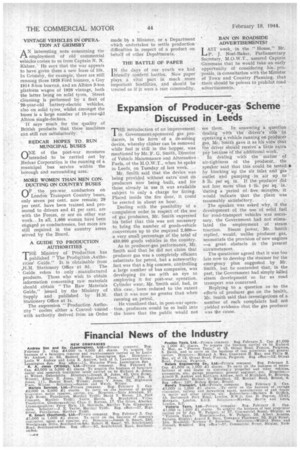Expansion of Producer-gas Scheme Discussed in Leeds
Page 18

If you've noticed an error in this article please click here to report it so we can fix it.
introduction of an improvement in Government-sponsored gas pro"ducets, in the form ' of a de-ashing device, whereby clinker can be removed while' fuel is still in the hopper, was mentioned by Mr. F. G. Smith, Director of Vehicle Maintenance and Alternative Fuels, of the M.O.W.T., when he spoke in Leeds, on Tuesday of last week. Mr. Smith said that the deVice was being provided without extra cost on producers now being built, and for those, already in use it was available subject to only a charge for fitting. Placed inside the fire door', it could be erected in about an hour.
Dealing with thepossibility "of a compulsion order in respect of the use of gas' producers, Mr. Smith expressed his belief that this was not necessary to bring the number of goods-vehicle conversions up to the required 2,000a very small percentage of the total of 450,000 goods vehicles in the country.
As to producer-gas performance, Mr. Smith said that he did not claim that producer gas was a completely efficient substitute for petrol, but a noteworthy fact was that a big concern, controlling a large number of bus companies, was developing its use with an eye to employing it for post-war operation. Cylinder wear, Mr. 'Smith said, had, in . this case, been reduced to the extent that it was now no greater than when running en petrol. • .
He visualized that, in post-war operation, producers would be so built into the buses that the public wbuld not see them. In answering a question
-dealing with the driver's role in operating a vehicle running on producer gas, Mr. Smith gave it as his view that the driver should receive a iiitle extra Pay because of the additional Work, In dealing with the matter of air-tightness of the producer, the speaker said that this could be tested • by blockino-° bp the air inlet apd outlet and pumping -in air up_ to 5 lb. per sq. in. If the producer did not lose more than 1 lb per sq. 'in.
'during a 'period of five minutes,. it . would indicate that the plant was reasonably satisfactory.
• The speaker was asked why, if the development of the use of solid fuel for road-transport vehicles was neces sary, the Government had not stimulated the employment of steam traction. Steam poser, Mr. Smith replied, would, unlike producer gas, necessitate the provision of new engines —a great obstacle in the present circumstances.
The questioner agreed that it was foo late now to develop the steamer for the emergency plan suggested by Mr. Smith, but he contended that, in the past, the Government had simply killed. steam development so far as road transport was concerned.
Replying to a question as to the effects of producer gas on the health, Mr. Smith said that investigations of a number of such complaints had not yielded evidence that the gas producer was the cause.




















































